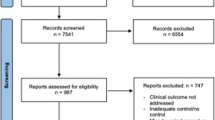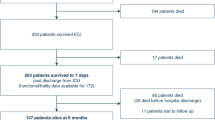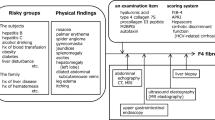Abstract
Background
Solid organ transplantation is the treatment of choice for organ failure, but donor organs are a scarce resource because of a large mismatch between supply and demand. This scarcity leads to an ethical dilemma, forcing priority setting in organ allocation to individual patients. Little is known about public preferences regarding priority setting in organ allocation. A systematic review was performed to review the existing evidence and provide an overview of the criteria and criterion levels in regard to ethical aspects of distributive justice.
Methods
The PubMed, Web of Science, EBSCO and PsycINFO databases were searched for literature published between January 2000 and December 2018. Only original studies were selected. The criteria were identified, extracted and grouped into a self-developed matrix according to the principles of distributive justice to ascertain public preferences.
Results
Overall, 9645 references were identified, and 15 studies were included. In total, 27 criteria clustered in seven theory-guided groups could be identified: “equality”, “effectiveness/benefit”, “medical urgency”, “own fault”, “value for society”, “medical background” and “sociodemographic status”. It was shown that not only a single principle but rather a combination of principles are relevant for the allocation. Therefore, a public propensity towards a rational utilitarian ethical model of allocation could be recognised.
Conclusions
The general public not only wanted to allocate organs mainly to those with a good probability of having a successful transplantation but also wanted to consider those who need an organ most urgently to prevent fatal consequences, resulting in unclear trade-offs between effectiveness/benefit and medical urgency. Public preferences for organ allocation are therefore complex, and data regarding clear trade-offs are still lacking.



Similar content being viewed by others
References
Pinson CW, Feurer ID, Payne JL, Wise PE, Shockley S, Speroff T. Health-related quality of life after different types of solid organ transplantation. Ann Surg. 2000;232:597–607.
Tong A, Sautenet B, Chapman JR, Harper C, MacDonald P, Shackel N, et al. Research priority setting in organ transplantation: a systematic review. Transpl Int. 2017;30:327–43.
Gutmann T, Land W. The ethics of organ allocation: the state of debate. Transpl Rev. 1997;11:191–207.
Eurotransplant (ET). Annual Report 2016. Eurotransplant International Foundation. Leiden: Eurotransplant Foundation; 2016.
Tong A, Jan S, Wong G, Craig JC, Irving MJ, Chadban S, et al. Rationing scarce organs for transplantation: healthcare provider perspectives on wait-listing and organ allocation. Clin Transpl. 2013;27:60–71.
Leichtman AB, McCullough KP, Wolfe RA. Improving the allocation system for deceased-donor kidneys. N Engl J Med. 2011;364:1287–9.
Gottlieb J, Gwinner W, Strassburg CP. Allocation systems in transplantation medicine: advantages and disadvantages. Internist (Berl). 2016;57:15–24.
Gesetz über die Spende, Entnahme und Übertragung von Organen und Geweben (Transplantationsgesetz—TPG) in der Fassung der Bekanntmachung vom 4. September 2007 (BGBl. I S. 2206), das zuletzt durch Artikel 2 des Gesetzes vom 18. Juli 2017 (BGBl. I S. 2757) geändert worden ist. [Act on organ and tissue donation, removal and transplantation (German Transplant Act, TPG)].
Bobbert M, Ganten TM. Liver allocation: urgency of need or prospect of success? Ethical considerations. Clin Transpl. 2013;27(Suppl. 25):34–9.
Schrem H, Focken M, Gunson B, Reichert B, Mirza D, Kreipe HH, et al. The new liver allocation score for transplantation is validated and improved transplant survival benefit in Germany but not in the United Kingdom. Liver Transpl. 2016;22:743–56.
Lamont J, Favor C. Distributive justice. In: Zalta EN, editor. The Standford encyclopedia of philosophy. 2017. https://plato.stanford.edu/entries/justice-distributive/. Accessed 25 Jan 2019.
Cookson R. Justice and the NICE approach. J Med Ethics. 2015;41:99–102.
Olsen JA. Theories of justice and their implications for priority setting in health care. J Health Econ. 1997;16:625–39.
Persad G, Wertheimer A, Emanuel EJ. Principles for allocation of scarce medical interventions. Lancet. 2009;373:423–31.
Shaw D, Gardiner D. Moral distance and distributive justice: how the increase in organ donation is helping us make better ethical decisions. Anaesthesia. 2015;70:10–3.
Tong A, Howard K, Jan S, Cass A, Rose J, Chadban S, Allen RD, Craig JC. Community preferences for the allocation of solid organs for transplantation: a systematic review. Transplantation. 2010;89:796–805.
Broumand M, Parsapoor A, Asghari F. Public opinion of organ donation: a survey in Iran. Clin Transpl. 2012;26:E500–4.
Chandler JA, Burkell JA, Shemie SD. Priority in organ allocation to previously registered donors: public perceptions of the fairness and effectiveness of priority systems. Prog Transpl. 2012;22:413–22.
Howard K, Jan S, Rose JM, Wong G, Craig JC, Irving MJ, et al. Preferences for policy options for deceased organ donation for transplantation: a discrete choice experiment. Transplantation. 2016;100:1136–48.
Irving MJ, Jan S, Tong A, Wong G, Craig JC, Chadban S, et al. What factors influence people’s decisions to register for organ donation? The results of a nominal group study. Transpl Int. 2014;27:617–24.
Li AT, Wong G, Irving MJ, Jan S, Tong A, Ralph AF, et al. Community-based interventions and individuals’ willingness to be a deceased organ donor: systematic review and meta-analysis. Transplantation. 2015;99:2634–43.
Moorlock G, Ives J, Bramhall S, Draper H. Should we reject donated organs on moral grounds or permit allocation using non-medical criteria? A qualitative study. Bioethics. 2016;30:282–92.
Morgan SE, Harrison TR, Afifi WA, Long SD, Stephenson MT. In their own words: the reasons why people will (not) sign an organ donor card. Health Commun. 2008;23:23–33.
Oedingen C, Bartling T, Krauth C. Public, medical professionals’ and patients’ preferences for the allocation of donor organs for transplantation: study protocol for discrete choice experiments. BMJ Open. 2018;8:e026040.
The Equator (enhancing the quality and transparency of health research) Network. http://www.equator-network.org/. Accessed 25 Jan 2019.
Tong A, Sainsbury P, Craig J. Consolidated Criteria for Reporting Qualitative Research (COREQ): a 32-item checklist for interviews and focus groups. Int J Qual Health Care. 2007;19:349–57.
Moher D, Liberati A, Tetzlaff J, Altman DG. Preferred Reporting Items for Systematic Reviews and Meta-Analyses: the PRISMA statement. BMJ. 2009;339:b2535.
Liberati A, Altman DG, Tetzlaff J, Mulrow C, Gøtzsche PC, Ioannidis JPA, et al. The PRISMA statement for reporting systematic reviews and meta-analyses of studies that evaluate healthcare interventions: explanation and elaboration. BMJ. 2009;339:b2700.
Pearson A, White H, Bath-Hextall F, Salmond S, Apostolo J, Kirkpatrick P. A mixed-methods approach to systematic reviews. Int J Evid Based Healthc. 2015;13:121–31.
Dolan P, Shaw R. A note on a discussion group study of public preferences regarding priorities in the allocation of donor kidneys. Health Policy. 2004;68:31–6.
Irving MJ, Tong A, Jan S, Wong G, Cass A, Allen RD, et al. Community preferences for the allocation of deceased donor organs for transplantation: a focus group study. Nephrol Dial Transpl. 2013;28:2187–93.
Wilmot S, Ratcliffe J. Principles of distributive justice used by members of the general public in the allocation of donor liver grafts for transplantation: a qualitative study. Health Expect. 2002;5:199–209.
Asghari F, Broumand M, Heidari A. Public preferences for donor kidney allocation: a study in Iran. Clin Transplant. 2013;27:718–23.
Balwani MR, Gumber MR, Shah PR, Kute VB, Patel HV, Engineer DP, et al. Attitude and awareness towards organ donation in western India. Ren Fail. 2015;37:582–8.
Browning CJ, Thomas SA. Community values and preferences in transplantation organ allocation decisions. Soc Sci Med. 2001;52:853–61.
Chan H, Cheung G, Yip A. Selection criteria for recipients of scarce donor livers: a public opinion survey in Hong Kong. Hong Kong Med J. 2006;12:40–6.
Dao Van M, Lauerer M, Schätzlein V. Nagel E. The trade-off between chance of success and urgency in organ allocation: a discrete choice experiment to elicit public preferences. Gesundheitswesen. 2016;78:454–9.
Howard K, Jan S, Rose JM, Wong G, Irving MJ, Tong A, et al. Community preferences for the allocation of donor organs for transplantation. A discrete choice study. Transplantation. 2015;99:560–7.
Ratcliffe J. Public preferences for the allocation of donor liver grafts for transplantation. Health Econ. 2000;9:137–48.
Ratcliffe J, Buxton M, Young T, Longworth L. Determining priority for liver transplantation: a comparison of cost per QALY and discrete choice experiment-generated public preferences. Appl Health Econ Health Policy. 2005;4:249–55.
Sears SF Jr, Marhefka SL, Rodrigue JR, Campbell C. The role of patients’ ability to pay, gender, and smoking history on public attitudes toward cardiac transplant allocation: an experimental investigation. Health Psychol. 2000;19:192–6.
Spital A. Should people who commit themselves to organ donation be granted preferred status to receive organ transplants? Clin Transpl. 2005;19:269–72.
Stahl JE, Tramontano AC, Swan JS, Cohen BJ. Balancing urgency, age and quality of life in organ allocation decisions: what would you do? A survey. J Med Ethics. 2008;34:109–15.
Stroh G, Rosell T, Dong F, Forster J. Early liver transplantation for patients with acute alcoholic hepatitis: public views and the effects on organ donation. Am J Transpl. 2015;15:1598–604.
Ubel PA, Jepson C, Baron J, Mohr T, McMorrow S, Asch DA. Allocation of transplantable organs: do people want to punish patients for causing their illness? Liver Transpl. 2001;7:600–7.
Merion RM, Ashby VB, Wolfe RA, Distant DA, Hulbert-Shearon TE, Metzger RA, et al. Deceased-donor characteristics and the survival benefit of kidney transplantation. JAMA. 2005;294:2726–33.
Laging M, Kal-van Gestel JA, van de Wetering J, IJzermans JN, Betjes MG, Weimar W, et al. A high comorbidity score should not be a contraindication for kidney transplantation. Transplantation. 2016;100:400–6.
Albertsen A. Drinking in the last chance saloon: luck egalitarianism, alcohol consumption, and the organ transplant waiting list. Med Health Care Philos. 2016;19:325–38.
Lippert-Rasmussen K. Arneson on equality of opportunity for welfare. J Polit Philos. 1999;7:478–87.
Wagstaff A. QALYs and the equity-efficiency trade-off. J Health Econ. 1991;10:21–41.
Nord E. The trade-off between severity of illness and treatment effect in cost-value analysis of health care. Health Policy. 1993;24:227–38.
Beauchamp TL, Childress JF. Principles of biomedical ethics. 7th ed. Oxford: University Press; 2013.
Author information
Authors and Affiliations
Contributions
CO contributed to the development of the study design, carried out the literature search and analysis, and drafted and improved the manuscript. TB carried out and reviewed the literature search and analysis, and reviewed and commented on the preliminary drafts and final version of the manuscript. ACM and HS reviewed and commented on the preliminary and final manuscript drafts. CK contributed to the development of the study design, reviewed and commented on the literature search and analysis, and reviewed and commented on the preliminary manuscript drafts and the final version. All authors agreed to be accountable for all aspects of this work, ensuring the integrity and accuracy of this systematic review. All authors revised the manuscript and approved it for publication.
Corresponding author
Ethics declarations
Funding
This study was funded by the German Federal Ministry of Education and Research (Grant no.: 01EH1603B).
Conflict of interest
Carina Oedingen and Tim Bartling were funded by the German Federal Ministry of Education and Research. The funding source had no role in the study and no influence on the data collection and analyses, interpretation of the results or writing of the publication. Axel C. Mühlbacher, Harald Schrem and Christian Krauth have no conflicts of interest that are directly relevant to the content of this article.
Data Availability
All data generated or analysed during this study are included in this published article and its Electronic Supplementary Material.
Electronic supplementary material
Below is the link to the electronic supplementary material.
Rights and permissions
About this article
Cite this article
Oedingen, C., Bartling, T., Mühlbacher, A.C. et al. Systematic Review of Public Preferences for the Allocation of Donor Organs for Transplantation: Principles of Distributive Justice. Patient 12, 475–489 (2019). https://doi.org/10.1007/s40271-019-00363-0
Published:
Issue Date:
DOI: https://doi.org/10.1007/s40271-019-00363-0




